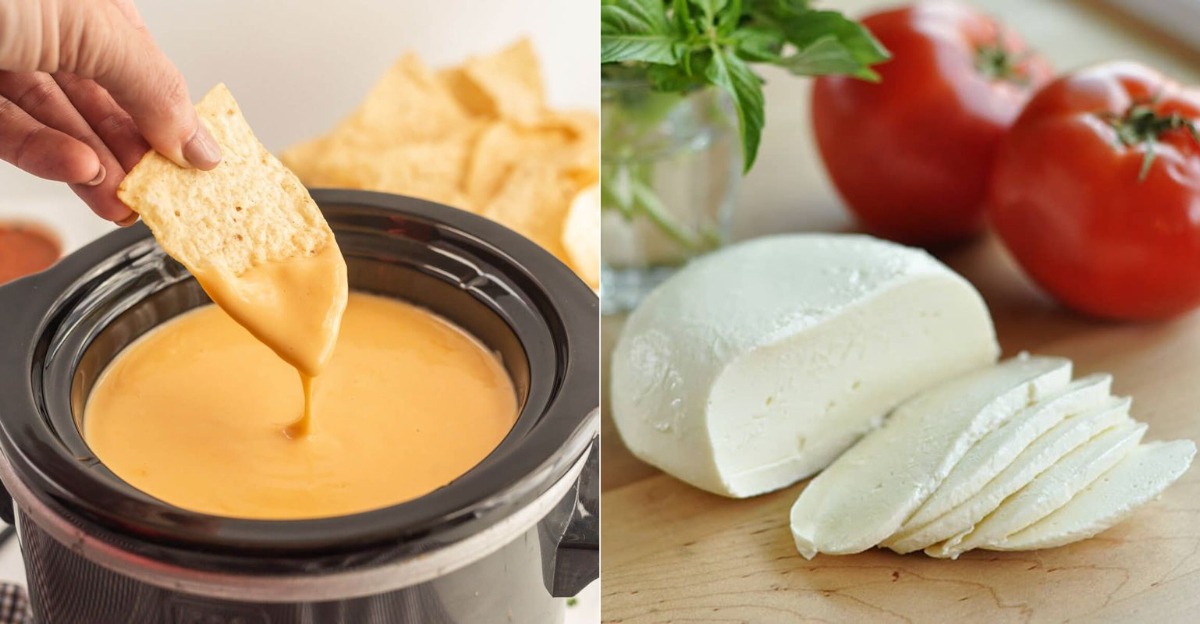8 Unhealthy Cheeses You Should Skip (And 8 You Can Eat Guilt-Free)

Not all cheeses are created equal when it comes to their health benefits. Some varieties pack alarming amounts of sodium, saturated fat, and preservatives that can wreak havoc on your heart and waistline.
But don’t toss out your cheese board just yet because plenty of delicious options offer impressive nutritional benefits without sacrificing flavor.
Let’s unwrap which cheeses deserve the boot and which deserve a spot in your fridge.
1. Processed American Cheese
Neon-orange and suspiciously meltable, processed American cheese barely qualifies as actual cheese. With only 51% real cheese content required by law, the rest is a laboratory experiment of emulsifiers, preservatives, and artificial colors.
Growing up, my mom called it “plastic cheese” – a nickname that feels eerily accurate considering it doesn’t even need refrigeration! Skip this ultra-processed option that delivers minimal nutrition with maximum additives.
2. Spray Cheese
Aerosol cheese defies both nature and nutrition. This pressurized cheese-like substance contains a startling list of ingredients, including whey protein concentrate, canola oil, and sodium phosphate, but surprisingly little actual cheese.
I once brought spray cheese to a camping trip, thinking it would be convenient. My friend’s five-year-old aptly renamed it “cheese toothpaste” after one disgusted bite!
With minimal protein and calcium but plenty of sodium and preservatives, this novelty item belongs in the trash, not your pantry.
3. Cheese Dips
Those tantalizing jars of queso and nacho cheese dips harbor a dark secret: they’re mostly oil, preservatives, and artificial flavors. Actual cheese content? Minimal at best. Most contain concerning levels of sodium, sometimes up to 400mg in just two tablespoons!
The vibrant yellow-orange color comes from artificial dyes rather than natural cheese properties. These shelf-stable concoctions prioritize longevity over nutrition, making them a poor choice for health-conscious snackers.
4. Full-Fat Ricotta
Creamy and decadent, full-fat ricotta delivers a whopping 32 grams of fat and 428 calories per cup – numbers that can derail even the most disciplined diet. Its high saturated fat content makes it a problematic choice for heart health.
Back in my lasagna-making days, I’d use entire tubs without thinking twice! Now I know better. While ricotta offers decent protein and calcium, the caloric density makes it easy to overindulge.
Save this indulgence for special occasions or opt for part-skim versions.
5. Mascarpone
Luxuriously smooth mascarpone might elevate your tiramisu, but it wreaks havoc on your health goals. This Italian cream cheese contains a staggering 120 calories and 13 grams of fat per ounce – more than double most other cheeses!
With almost no protein to offset its caloric density, mascarpone offers little nutritional value beyond its rich taste. The 44% saturated fat content places it firmly in the occasional treat category.
Your arteries will thank you for reserving this indulgence for special occasions only.
6. Double or Triple Cream Brie
Buttery double and triple cream brie varieties may seduce your taste buds, but they’re nutritional nightmares. These ultra-rich versions contain added cream, boosting fat content to 60-75% (compared to regular brie’s 45%).
Just one ounce delivers 100+ calories and 8-10 grams of fat, mostly saturated. The decadent mouthfeel comes at a steep nutritional cost.
Even cheese connoisseurs should exercise portion control with these creamy calorie bombs or opt for regular brie instead.
7. Cheese Spreads
Those convenient tubs of flavored cheese spread might seem innocent, but they’re often nutritional landmines. Many contain concerning amounts of sodium, sometimes 400mg per serving, plus emulsifiers, preservatives, and artificial flavors.
The cheese content is diluted with oils and fillers to achieve that spreadable texture. I once checked the label on my favorite garlic herb spread and was shocked to find it contained 15 ingredients!
For a healthier alternative, try blending cottage cheese with fresh herbs instead.
8. Imported Full-Fat Feta
Traditional imported feta packs a double whammy of saturated fat and sodium that would make any cardiologist cringe. Made from sheep’s milk, this crumbly Greek staple contains up to 6 grams of fat per ounce and an eye-watering 400mg of sodium.
While feta offers decent protein and calcium, its salt content makes it problematic for those monitoring blood pressure.
One Greek salad at lunch left my fingers so swollen I could barely type all afternoon! Moderation is key with this Mediterranean favorite.
9. Fresh Mozzarella
Milky-white fresh mozzarella brings Mediterranean magic to your meals without nutritional baggage. This Italian treasure contains less sodium and fat than most cheeses while delivering satisfying protein and calcium.
Made from simple ingredients – milk, rennet, and salt – it’s minimally processed and free from additives. Its high moisture content (around 50%) means fewer calories per serving than aged cheeses.
Pair with tomatoes and basil for a protein-rich caprese salad that’s as nutritious as it is delicious.
10. Feta Made with Goat’s Milk
Goat milk feta offers the tangy flavor you crave with fewer digestive issues than cow’s milk varieties. Naturally lower in lactose and A1 casein protein, it’s gentler on sensitive stomachs while providing excellent nutrition.
With about 30% less calories and fat than traditional sheep’s milk feta, this Mediterranean option doesn’t sacrifice flavor for health benefits. My lactose-intolerant cousin discovered she could enjoy goat feta without discomfort!
Look for versions packed in brine rather than oil for the healthiest option.
11. Cottage Cheese
Fitness enthusiasts have long treasured cottage cheese as a protein powerhouse. With an impressive 14 grams of protein per half-cup, it outperforms most other dairy options while keeping calories reasonable (around 100 per serving).
This lumpy wonder also delivers calcium, phosphorus, and B vitamins with minimal processing. Low-fat versions reduce saturated fat without sacrificing nutrition.
I keep it in my fridge for quick protein-rich breakfasts – topped with fruit and cinnamon, it’s practically dessert!
12. Part-Skim Ricotta
Part-skim ricotta delivers the creamy texture you love with substantially less fat. This lighter version cuts calories by nearly 50% compared to whole-milk varieties while maintaining impressive calcium and protein content.
With 14 grams of protein and just 10 grams of fat per half-cup, it’s a nutritional bargain. The mild flavor works beautifully in both sweet and savory dishes.
I’ve fooled countless dinner guests with my “skinny” lasagna – nobody can tell I’ve swapped full-fat for part-skim!
13. Neufchâtel
Neufchâtel is cream cheese’s sophisticated, slimmer French cousin. With one-third less fat than traditional cream cheese but the same spreadable texture and tangy flavor, it’s the ultimate healthy swap.
This soft cheese delivers more protein and less saturated fat while keeping the creamy mouthfeel you crave. Found right next to regular cream cheese in most grocery stores, it’s an easy substitution in recipes.
My morning bagel routine got significantly healthier when I made the switch!
14. Goat Cheese
Tangy goat cheese delivers a distinctive flavor with impressive digestibility. Its unique fatty acid profile – featuring medium-chain triglycerides – makes it easier for your body to process than cow’s milk cheeses.
With about 40% fewer calories and fat than cream cheese, goat cheese offers a luxurious mouthfeel without dietary guilt. The protein structure differs from cow’s milk, making it suitable for many who experience dairy sensitivities.
A small medallion adds tremendous flavor to salads and vegetables with minimal caloric impact.
15. Parmesan
Aged Parmesan packs maximum flavor with minimum volume, making portion control effortless. Just one tablespoon of freshly grated Parmigiano-Reggiano delivers a bold, nutty taste for only 22 calories and 1.5 grams of fat.
The aging process concentrates protein (a remarkable 10 grams per ounce) while developing complex flavors that satisfy with smaller amounts. As a lactose-intolerant cheese lover myself, I appreciate that the aging process breaks down nearly all lactose!
Choose authentic Parmigiano-Reggiano over processed versions for maximum health benefits.
16. String Cheese
Perfectly portioned string cheese sticks deliver protein-packed satisfaction on the go. Each individually wrapped stick contains about 80 calories, 6 grams of protein, and 200mg of bone-building calcium – all in a fun-to-eat format.
Made from mozzarella, string cheese undergoes minimal processing and contains no artificial flavors or colors. The portion-controlled packaging prevents mindless overeating.
My gym bag always contains a stick or two for post-workout recovery – they’re stable at room temperature for hours!
